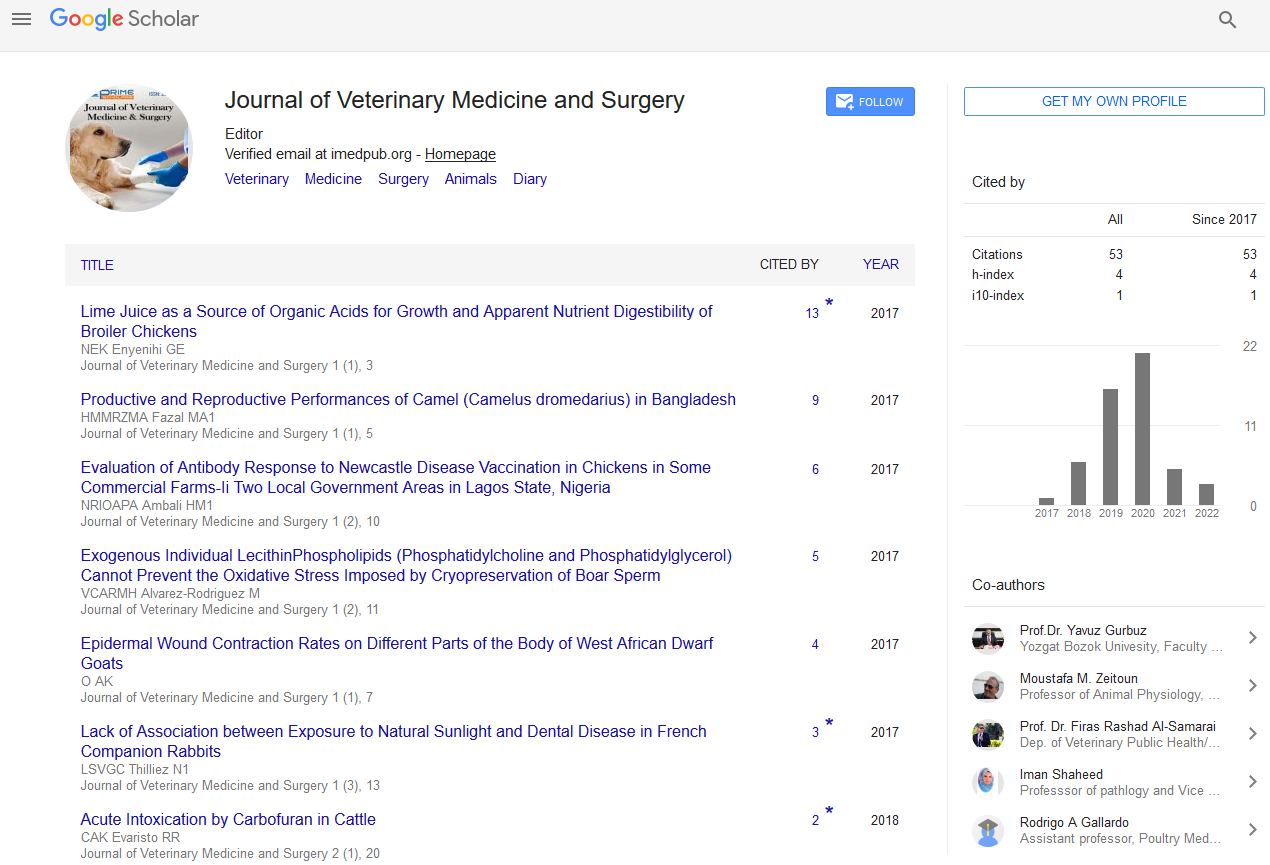Opinion - (2024) Volume 8, Issue 1
Exploring Theriogenology: The Intersection of Veterinary Medicine and Reproductive Health
Shikamaru Nara*
Department of Veterinary, Tohoku University, Japan
*Correspondence:
Shikamaru Nara,
Department of Veterinary, Tohoku University,
Japan,
Email:
Received: 28-Feb-2024, Manuscript No. IPJVMS-24-19441;
Editor assigned: 01-Mar-2024, Pre QC No. IPJVMS-24-19441 (PQ);
Reviewed: 15-Mar-2024, QC No. IPJVMS-24-19441;
Revised: 20-Mar-2024, Manuscript No. IPJVMS-24-19441 (R);
Published:
27-Mar-2024, DOI: 10.36648/2574-2868.8.1.09
Introduction
Theriogenology, a specialized branch of veterinary medicine,
focuses on the study and management of animal reproduction.
Derived from the Greek words “therio” (meaning beast) and
“genetics” (meaning the study of heredity), theriogenology
encompasses a wide range of disciplines, including obstetrics,
gynecology, andrology, endocrinology, reproductive surgery,
and Assisted Reproductive Technologies (ART). In this article,
we delve into the fascinating world of theriogenology, exploring
its importance in animal agriculture, companion animal care,
and conservation efforts. Theriogenology plays a crucial role
in various aspects of animal health, welfare, and production.
Whether it’s ensuring the reproductive success of livestock
species, addressing infertility in companion animals, or
preserving endangered wildlife populations, theriogenologists
work tirelessly to promote reproductive health and genetic
diversity in animals around the world. Theriogenologists work
with livestock producers to optimize breeding programs,
manage reproductive disorders, and enhance fertility
through strategies such as Artificial Insemination (AI), embryo
transfer, and reproductive hormone therapies. Infertility and
reproductive disorders can affect companion animals such as
dogs, cats, and horses, leading to frustration and disappointment
for pet owners. In conservation efforts aimed at preserving
endangered species and biodiversity, theriogenologists play a
critical role in managing captive breeding programs, conducting
assisted reproductive techniques, and monitoring reproductive
health in wild populations. By applying reproductive science
and technology, theriogenologists contribute to the survival
and sustainability of threatened and endangered species
worldwide.
Description
Theriogenologists are veterinary specialists with advanced
training and expertise in reproductive medicine and surgery.
They work collaboratively with veterinarians, animal scientists,
and breeders to address a wide range of reproductive
issues in animals. Theriogenologists conduct thorough
reproductive evaluations, including physical examinations,
ultrasonography, hormonal assays, and semen analysis, to
assess reproductive health and identify underlying causes
of infertility or reproductive disorders. Based on diagnostic
findings, theriogenologists develop customized treatment
plans to address reproductive problems in animals. This may
include medical therapies, surgical interventions, nutritional
modifications, and lifestyle changes aimed at optimizing fertility
and reproductive success. Theriogenologists are skilled in
performing advanced reproductive techniques such as artificial
insemination, embryo transfer, In Vitro Fertilization (IVF),
Intracytoplasmic Sperm Injection (ICSI), and cryopreservation of
gametes and embryos. These techniques enable precise control
over breeding outcomes and facilitate genetic improvement
and conservation efforts. Theriogenologists provide obstetric
and neonatal care for pregnant animals and newborn offspring,
including monitoring pregnancy progress, assisting with labor
and delivery, managing obstetric emergencies, and providing
neonatal care and support.
Conclusion
Theriogenology plays a vital role in promoting reproductive
health, genetic diversity, and sustainability in animals across
diverse species and ecosystems. From optimizing livestock
production and supporting companion animal breeding
programs to conserving endangered species and preserving
biodiversity, theriogenologists make invaluable contributions
to animal health, welfare, and conservation efforts worldwide.
As we continue to advance our understanding of reproductive
biology and develop innovative technologies and strategies for
managing reproductive disorders, theriogenology will remain
at the forefront of veterinary medicine, shaping the future of
animal reproduction and fertility management for generations
to come.
Citation: Nara S (2024) Exploring Theriogenology: The Intersection of Veterinary Medicine and Reproductive Health. J Veterinary Med. 8:09.
Copyright: © 2024 Nara S. This is an open-access article distributed under the terms of the Creative Commons Attribution License, which permits unrestricted use, distribution, and reproduction in any medium, provided the original author and source are credited.

